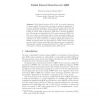Free Online Productivity Tools
i2Speak
i2Symbol
i2OCR
iTex2Img
iWeb2Print
iWeb2Shot
i2Type
iPdf2Split
iPdf2Merge
i2Bopomofo
i2Arabic
i2Style
i2Image
i2PDF
iLatex2Rtf
Sci2ools
185
click to vote
SAT
2011
Springer
2011
Springer
Failed Literal Detection for QBF
Failed literal detection (FL) in SAT is a powerful approach for preprocessing. The basic idea is to assign a variable as assumption. If boolean constraint propagation (BCP) yields an empty clause then the negated assumption is necessary for satisfiability. Whereas FL is common in SAT, it cannot easily be applied to QBF due to universal quantification. We present two approaches for FL to preprocess prenex CNFs. The ne is based on abstraction where certain universal variables are treated as existentially quantified. Second we combine QBF-specific BCP (QBCP) in FL with Q-resolution to validate assignments learnt by FL. Finally we compare these two approaches to a third common approach based on SAT. It turns out that the three approaches are incomparable. Experimental evaluation demonstrates that FL for QBF can improve the performance of search- and elimination-based QBF solvers.
| Added | 17 Sep 2011 |
| Updated | 17 Sep 2011 |
| Type | Journal |
| Year | 2011 |
| Where | SAT |
| Authors | Florian Lonsing, Armin Biere |
Comments (0)

